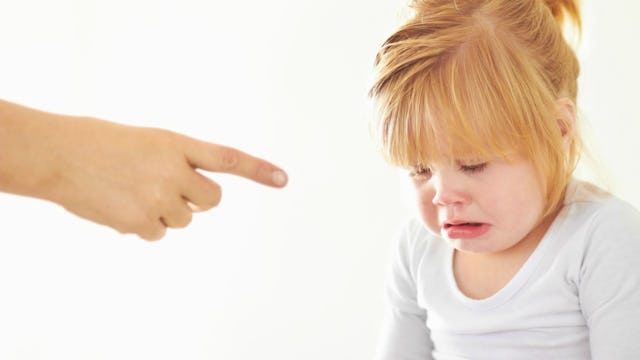It's Time To Quit The Abusive Practice Of Mocking Children's Emotions

It was a normal, everyday moment in a busy shopping center. Shoppers perusing the aisles for discount shorts, grabbing last-minute groceries and knick-knacks that weren’t exactly in the budget.
RELATED: Tips And Tactics For Effectively Disciplining Your Toddler
And a little girl was having a code red meltdown in home improvement because her snack had fallen through the grated cart and onto the floor.
You’ve never seen a child grieve a snack-loss so deeply.
She bargained like her life depended on that one last bite of Quaker granola bar. And when she realized the battle was truly lost, a volcanic tantrum erupted. Sobbing, thrashing, hiccuping breaths — the whole nine yards. I thought she might vomit, actually. It was that impressive.
Shoppers walked past the aisle right when crap hit the fan, of course, and some paused to offer a moment of solidarity for the poor woman dealing with this mess.
Because this is mom life, ladies. We aren’t alone in this.
But then it happened. The woman slammed her purse down into the cart, raised her voice to a scream, and proceeded to berate the child at top volume in the middle of the store.
“Do you see that everybody’s staring at you? Do you want to know why? They are staring because you are acting like such a big baby! Do you feel better now, you whiny baby? Whaaa! Whaaa! Do you need a diaper change?”
She kicked the broken granola bar beneath the shelves and pointed a finger directly into the child’s face.
“Stop that crying this minute, and act like a big girl. Now.”
The child quieted immediately, but tears continued down her cheeks as she sucked in breath after breath, trying to calm the hysterical emotions swirling inside her. Her big brown eyes gazed downward at her Velcro sneakers. She was humiliated.
“All that over a freaking granola bar!” the woman huffed and pushed the cart quickly away.
It’s important to state, for the record, that I am not a perfect mother. I lose my temper, make poor parenting decisions, and regularly apologize to my children for doing said things. I have been in this woman’s shoes before.
But I’ve also been in those glittery pink Velcro shoes, the weight of humiliation and shame pressing down on my tiny little shoulders.
Because, you see, that child was me.
That woman? She was my babysitter.
And there’s a reason I’m sharing this with you today.
I realize that when it comes to discipline, individuals have to determine what works for their children. And we all have moments where we lose our cool, even in public, despite our parenting philosophies.
But there is one thing that will never work, should never be considered acceptable, and will never merit a nod of approval from this mama right here.
And that is the berating and mocking of children for expressing their emotions.
Being a parent is hard work. It is hard to keep several small humans safe and growing, emotionally and physically, while also caring for yourself and an entire household. But you know what else is really freaking hard? Being a child.
Feeling a storm of emotions swirl in your little brain, out of control, and not yet having the ability to manage them.
As adults, it is our job to teach our children these skills. As adults, it is our responsibility to be calm when that storm rolls in, and patiently guide those little souls out of the choppy waters.
Nobody else will raise our children to be emotionally stable, self-secure adults. That falls on us. Nobody else is going to teach our children to navigate those tidal waves of big feelings. That also falls on us.
And I get it — children’s brains are a tempestuous place. They have no control over what is chemically affecting their bodies and sending their little emotions into overdrive. They are growing and developing each day. And oftentimes, that can present frustrating (and embarrassing) scenarios for parents and caregivers.
But what children need from adults during these times isn’t shame, never shame, but validation that what they are feeling is real. They don’t need to be berated for their temporary inability to channel those feelings. They need empathy and guidance on healthy ways to deal with them.
Now, am I saying it’s acceptable for a kid to squall over a fallen granola bar like an adult who has lost a family member?
No.
But children don’t have fully developed frontal lobes, and we do. This is key, and we must remember this.
So parents, educators, child care providers, please, for the sake of these children, let’s take our fully developed frontal lobes and our grown-ass abilities to control our emotions, and let’s lovingly help our kids learn these skills. Take the time to validate children’s feelings and guide them through their outbursts. Teach them that emotions are healthy and normal, and that there are multiple ways to express their sadness, anger, and hurt.
Because if you look at a child who is feeling broken, and your first response is to match their rage and launch into a shaming tirade, well…you are far more ridiculous than a toddler crying over a granola bar.
And you are the one who needs to get your emotional shit together. Not the freaking kid.
This article was originally published on